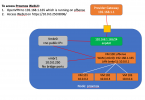Hello,
Hoping some people with more experience with Proxmox than me can assist. I've had this setup working for years in ESXi, but I'm not sure how to recreate it in Proxmox.
Setup:
I've started with this in /etc/network/interfaces, which DOES work, but Proxmox can't be reached on 10.0.0.250.
Hope someone can help.
Thanks!
Hoping some people with more experience with Proxmox than me can assist. I've had this setup working for years in ESXi, but I'm not sure how to recreate it in Proxmox.
Setup:
- 1 Public IP (for testing, let's call this 192.168.1.165)
- I want to assign that public IP to a pfSense VM running on Proxmox
- I do NOT want Proxmox webUI available on the internet, nor do I want it to have a routable IP on the internet
- I want Proxmox WebUI to be available within the pfSense LAN IP Range (let's call it 10.0.0.0/16)
- OpenVPN Server is running on pfSense, which is what I use to "connect" to the pfSense network, where I would also want to access the Proxmox UI on https://10.0.0.250:8006/
I've started with this in /etc/network/interfaces, which DOES work, but Proxmox can't be reached on 10.0.0.250.
Code:
auto lo
iface lo inet loopback
iface enp4s0 inet manual
iface enp5s0 inet manual
auto vmbr0
iface vmbr0 inet static
address 999.999.999.999/24
bridge-ports enp4s0
bridge-stp off
bridge-fd0
#WAN
auto vmbr1
iface vmbr1 inet static
address 10.0.0.250/24
gateway 10.0.0.1
bridge-ports none
bridge-stp off
bridge-fs 0
#LANHope someone can help.
Thanks!


